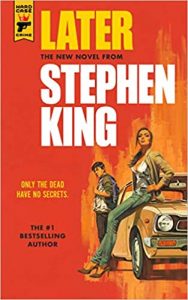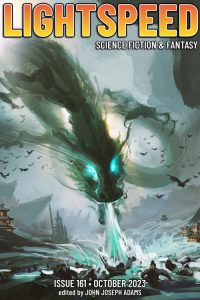Gabino Iglesias Reviews Later by Stephen King
 Later, Stephen King (Hard Case Crime 978-1-78909-649-1, $14.95, 272pp, tp) March 2021. Cover by Paul Mann.
Later, Stephen King (Hard Case Crime 978-1-78909-649-1, $14.95, 272pp, tp) March 2021. Cover by Paul Mann.
Later, Stephen King’s latest, is a horror story – something the narrator reminds readers of from time to time – but it’s one dressed up like a thriller with supernatural elements, and it has all the working parts of a pulpy crime novel. King has been known to walk the interstitial space between genres for most of his career, and Later is proof that he does his best work when mixing elements from various genres while keeping horror at the core of his narratives.
Jamie Conklin is the only son of a struggling mother battling to make ends meet as a literary agent. Jamie wants to do well and lead the kind of life every other kid seems to have, but there’s something special keeping him from being completely normal: Jamie can see ghosts and talk to them. His ability is a blessing and a curse. On one hand, it allows him to help his mother when her best author dies without finishing the last book in his successful series. On the other, it gets him into deep trouble at two different times when a woman his mother dated for years forces Jamie to help her with cases she encounters as an NYPD detective. The first time, he helps her figure out the last act of Kenneth Therriault, a serial bomber, and the ghost attaches itself to Jamie. The second time, things get even darker and more complicated. At once a coming-of-age story, a narrative about a haunted young man trying to do the right thing, and a tale about a crooked detective with a taste for drugs, this is an action-packed novel with a memorable narrator that explores how secrets can drive people to commit horrible acts, and how doing the right thing is not always the best option.
King does many things right in Later. The first one is characterization. Jamie, his mother, and the NYPD detective, Liz Dutton, feel like fleshed out characters with unique lives and personalities. The way they interact in the story has an arc as they all move through the years and more of who they are, and who they become, is revealed. Also, the dialogue is believable and carries a lot of the action in crucial moments.
The one element King nails here is one we rarely talk about because it’s hard to discuss. For lack of a better word, we usually call it readability. Yes, this is a combination of good plot, dialogue, and economy of language, but it also involves the characters’ voices and the ability of an author to tell a story. King is a superb storyteller, and he shows that here. Later is gripping and easy to read. The narrative progress at an enjoyable pace and it’s easy to stay glued to the book. Also, Jamie’s voice is likeable. He’s a good kid caught in some awful situations, and this helps readers develop a lot of sympathy, which is the one element that makes or breaks horror novels.
While this is a coming-of-age novel and some of the thoughts Jamie has clearly communicate that (“Tell you what, the worst part of growing up is how it shuts you up”), Later also contains enough guns, crooked cops, and guns to satisfy readers of crime fiction and enough horror to be easily identified as a Stephen King novel. In fact, when Jamie looks to a family friend, a literature professors named Martin Burkett, for help, the aging scholar gives him a talk that brings to mind the work of H.P. Lovecraft as the professor discusses how the ghost haunting Jamie is “from outside the universe” and goes on to state: “There are horrors there that no man can conceive of. If you truck with it you risk death, madness, or the destruction of your very soul.” And that haunting is a big part of the book. Therriault is an angry, dangerous ghost, and the way it affects Jamie’s psyche permeates the novel:
I kept thinking I’d open my closet to get a shirt and he’d be in there, my own personal boogeyman. Or under the bed, and what if he grabbed my wrist or my dangling foot while I was sleeping? I didn’t think he could grab, but I wasn’t sure of that, either, especially if he was getting stronger.
Ultimately, Later succeeds because it’s a fun read. We often hear that dead men tell no tales, and this story proves that wrong. The dead do tell tales, but only some people can hear them, and when they do, what they do with that information can have a huge impact on the world of the living.
Gabino Iglesias is a writer, journalist, professor, and book reviewer living in Austin TX. He is the author of Zero Saints and Coyote Songs and the editor of Both Sides. His work has been nominated to the Bram Stoker and Locus Awards and won the Wonderland Book Award for Best Novel in 2019. His short stories have appeared in a plethora of anthologies and his non-fiction has appeared in the New York Times, the Los Angeles Times, and CrimeReads. His work has been published in five languages, optioned for film, and praised by authors as diverse as Roxane Gay, David Joy, Jerry Stahl, and Meg Gardiner. His reviews appear regularly in places like NPR, Publishers Weekly, the San Francisco Chronicle, Criminal Element, Mystery Tribune, Vol. 1 Brooklyn, the Los Angeles Review of Books, and other print and online venues. He’s been a juror for the Shirley Jackson Awards twice and has judged the PANK Big Book Contest, the Splatterpunk Awards, and the Newfound Prose Prize. He teaches creative writing at Southern New Hampshire University’s online MFA program. You can find him on Twitter at @Gabino_Iglesias.
This review and more like it in the June 2021 issue of Locus.
 While you are here, please take a moment to support Locus with a one-time or recurring donation. We rely on reader donations to keep the magazine and site going, and would like to keep the site paywall free, but WE NEED YOUR FINANCIAL SUPPORT to continue quality coverage of the science fiction and fantasy field.
While you are here, please take a moment to support Locus with a one-time or recurring donation. We rely on reader donations to keep the magazine and site going, and would like to keep the site paywall free, but WE NEED YOUR FINANCIAL SUPPORT to continue quality coverage of the science fiction and fantasy field.
©Locus Magazine. Copyrighted material may not be republished without permission of LSFF.






